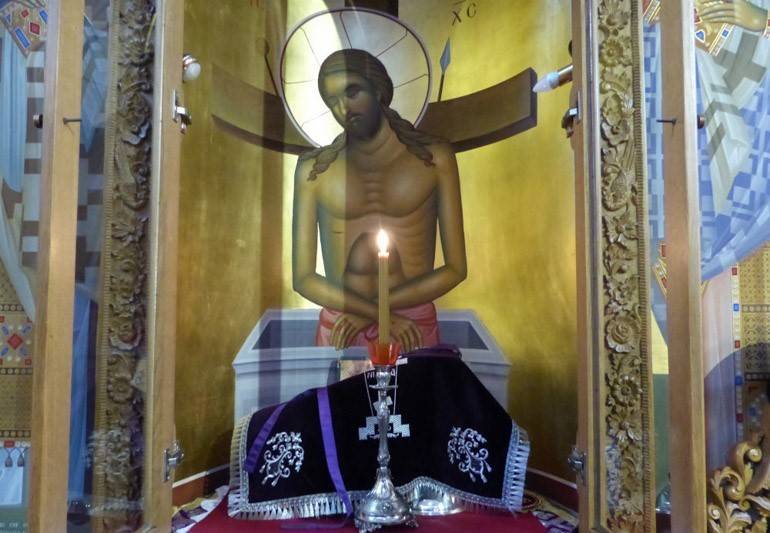
Blessed Patriarch Paul on fasting and communion
What Holy Communion means for the spiritual life of a Christian is clear from the words of the Lord himself: "I am the living Bread that came down from heaven." Whoever eats this Bread will live forever... If you do not eat the flesh of the Son of Man and drink his blood, you will not have life in you. Whoever eats my Body and drinks my Blood has eternal life and I will resurrect him on the last day. Because my Body is real food and my Blood is real drink." Out of complete faith in these words of the Lord, the first Christians hurried to Communion, not according to any order, but directly from the feeling that without Him they cannot live spiritually, just as a person cannot breathe by order, but spontaneously, feeling that he is suffocating without air and dying. They always went to the Liturgy on Sundays and holidays and at the deacon's invitation - "approach with the fear of God and faith!" they all approached and received communion. At the same time, they fully felt that they were approaching the deepest secret of our faith and the greatest gift of God's mercy, so they tried to approach the All-Holy and Most Pure God, in the Holy Communion, in purity and holiness of heart and soul. They were called "saints," and indeed they were; they guarded themselves from every sin, because they knew that "who commits sin is a slave to sin", that sin turns a person in a direction that leads against God, pollutes the soul and makes it incapable of St. communion. The one who still fell into sin, got up immediately, cleansed his soul by confession so that he would not receive Holy Communion in impurity: "For he who eats and drinks unworthily (the Bread and the Cup of the Lord) judges himself eating and drinking, not distinguishing between the Body and Blood of the Lord."
At the same time, Christians kept the institution of fasting sacred, knowing that fasting is a divine institution, because even in the Old Testament, God ordered fasting as an "eternal command". In the New Testament, the Lord Jesus Christ himself fasted and said that His disciples would fast. The Apostles and all the Saints fasted... They fasted at a certain time for the need of fasting, and they received communion for the need of communion constantly, both during fasting and during Lent; fasting and communion were fasted, and communion was given in mass, just as priests do today. Originally, there was no special preparation for Holy Communion, nor was fasting considered one of the means for it. One prepared for the Holy Communion with one's whole life, keeping all God's commandments and guarding against every sin.
This is how the priests and believers in the Christian Church acted during the entire period of persecution, for the first 300 years, while only those who, out of firm faith in the Kingdom of Heaven, were ready for all difficulties to gain it, entered it. The moral life of Christians was at a great height then. But when freedom came, under Emperor Constantine, in the year 313, those who did not look for it and found "treasure hidden in the field" and who were not ready to give everything to buy that field began to approach the Church... Therefore, it lowers the level of moral life of Christians in many ways. Even then, many approach Holy Communion regularly, but without serious care to be as worthy as possible for Him. Others, on the other hand, begin to postpone their regular approach to the Holy Grail, with the excuse that they want to prepare as well as possible. But they did not fight for the purification of their souls constantly, but occasionally, just a few days before Holy Communion. But even that was difficult for them, so they postponed the preparation and communion itself more and more often, until they decided to receive communion only four times a year or even less often.
Because of the first ones, the Church, according to St. John Chrysostom, and instituted a forty-day fast before Christmas and Easter: Noticing the damage that comes from careless behavior, the Fathers determined 40 days... so that all of us, having cleansed ourselves carefully during these days with prayers, almsgiving, fasting, all-night vigil, and tears, would thus approach Communion with a clear conscience, as much as possible." The Holy Father reminds the others that they must make an effort not occasionally, before Communion itself, but that they should live constantly so that they can access it regularly with a clear conscience. To the question "who should be given the right, those who rarely receive communion, or those who do it often", he answers: "Neither to one nor the other, but to those who receive communion with a clear conscience, a pure heart and a blameless life." They always fit like that. And those who are not like that - never. Because they bring judgment, condemnation, punishment and torment upon themselves."
But of all the means of cleansing the soul for this most intimate meeting and for union with the Lord, about receiving His Body and Blood, in the consciousness of our people it has come to the point that everything and everyone can be seen in bodily fasting. Many of the priests will ask the faithful before Communion just one question: "Have you fasted?" and, when they hear an affirmative answer, they will say: "Approach!" As if that is the only important thing, and everything else is irrelevant, and that - does this person know what does he approach and why, and that - does he know the Symbol of Faith and basic prayers, and that his mouth and tongue are clean of lies, curses and bad words, and that they may not be fornicators; and if it is a woman, that she is not perhaps superstitious, that she does not go to witch doctors and fortune-tellers, that she does not wear any amulets, or that she does not perform an abortion... And about the priest's interest in regular prayer, reading the Scriptures and devotional thoughts of the one who wants to receive communion , and let's not talk.
Against such a mechanical approach to Communion, in the Orthodox world, priests - pastors intensively strive to ensure that the faithful receive communion as often as possible, preferably at every Liturgy, preparing for it by constant vigil over their souls. Knowing the good spiritual condition of each individual member of their flock, they advise some to receive Holy Communion several times during Lent, others to do so during Lent as well, with some fasting for two to three days, others for seven days, and others to receive Holy Communion constantly and without fasting…
It is indisputable that the understanding of our faithful should be raised in the direction of regular access to the Sacrament of Communion, but on the condition that they constantly watch over the purity of their souls, over keeping a spiritual fast, guarding their hearts, eyes, ears, and all their senses from everything sinful, and not just keeping physical fasting and only one week before Holy Communion. So, we should avoid extremes and one-sidedness.
Blessed Patriarch Pavle
Source: Ibarske novosti - column "Žički blagovesnik"
PHOTOS
RELATED ARTICLES
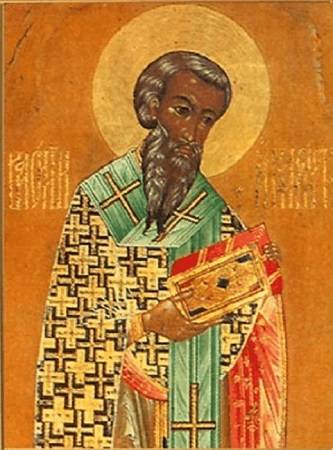
Calendar for May 9 His Homilist Basil of Amasia
Licinius, the son-in-law of Emperor Constantine, whose sister he had married,...
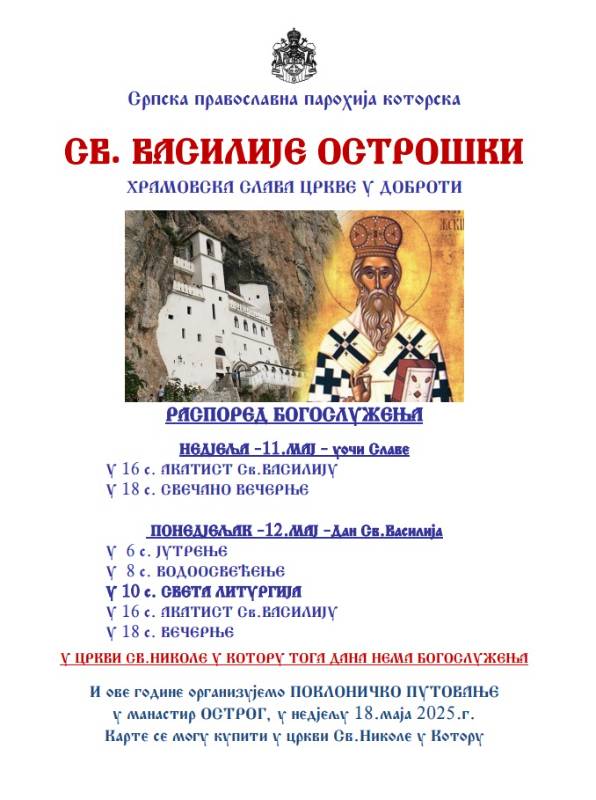
WORSHIPS ON THE OCCASION OF ST. VASILIJE OSTROŠKI
SERBIAN ORTHODOX PARISH OF KOTOR ANNOUNCES WORSHIPS ON THE OCCASION OF ST....
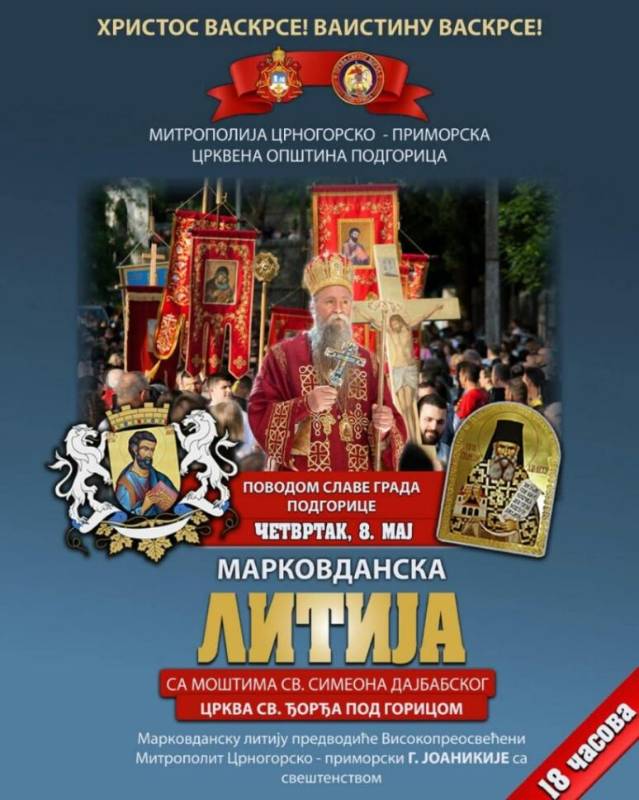
St. Mark's Day procession in Podgorica
On the occasion of the celebration of the city of Podgorica, the...


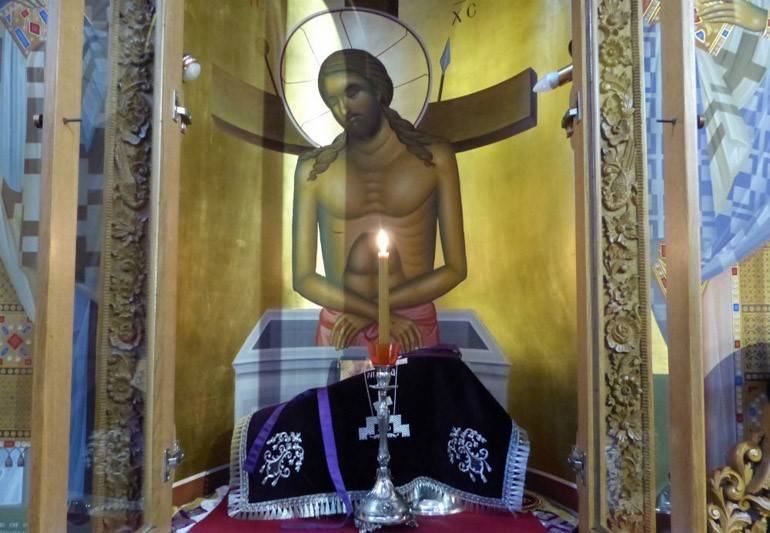

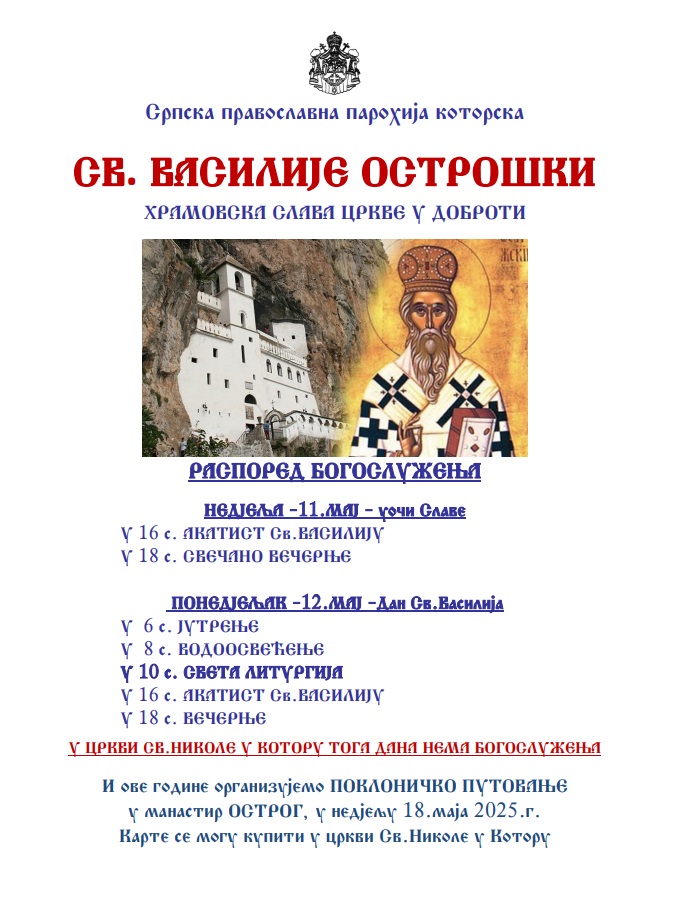
.png)